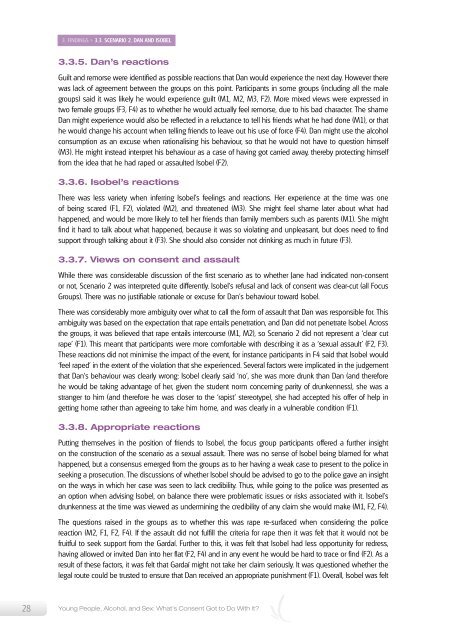Whats-Consent-Full-A41
Whats-Consent-Full-A41
Whats-Consent-Full-A41
Create successful ePaper yourself
Turn your PDF publications into a flip-book with our unique Google optimized e-Paper software.
3. Findings > 3.3. Scenario 2. Dan and Isobel3.3.5. Dan’s reactionsGuilt and remorse were identified as possible reactions that Dan would experience the next day. However therewas lack of agreement between the groups on this point. Participants in some groups (including all the malegroups) said it was likely he would experience guilt (M1, M2, M3, F2). More mixed views were expressed intwo female groups (F3, F4) as to whether he would actually feel remorse, due to his bad character. The shameDan might experience would also be reflected in a reluctance to tell his friends what he had done (M1), or thathe would change his account when telling friends to leave out his use of force (F4). Dan might use the alcoholconsumption as an excuse when rationalising his behaviour, so that he would not have to question himself(M3). He might instead interpret his behaviour as a case of having got carried away, thereby protecting himselffrom the idea that he had raped or assaulted Isobel (F2).3.3.6. Isobel’s reactionsThere was less variety when inferring Isobel’s feelings and reactions. Her experience at the time was oneof being scared (F1, F2), violated (M2), and threatened (M3). She might feel shame later about what hadhappened, and would be more likely to tell her friends than family members such as parents (M1). She mightfind it hard to talk about what happened, because it was so violating and unpleasant, but does need to findsupport through talking about it (F3). She should also consider not drinking as much in future (F3).3.3.7. Views on consent and assaultWhile there was considerable discussion of the first scenario as to whether Jane had indicated non-consentor not, Scenario 2 was interpreted quite differently. Isobel’s refusal and lack of consent was clear-cut (all FocusGroups). There was no justifiable rationale or excuse for Dan’s behaviour toward Isobel.There was considerably more ambiguity over what to call the form of assault that Dan was responsible for. Thisambiguity was based on the expectation that rape entails penetration, and Dan did not penetrate Isobel. Acrossthe groups, it was believed that rape entails intercourse (M1, M2), so Scenario 2 did not represent a ‘clear cutrape’ (F1). This meant that participants were more comfortable with describing it as a ‘sexual assault’ (F2, F3).These reactions did not minimise the impact of the event, for instance participants in F4 said that Isobel would‘feel raped’ in the extent of the violation that she experienced. Several factors were implicated in the judgementthat Dan’s behaviour was clearly wrong: Isobel clearly said ‘no’, she was more drunk than Dan (and thereforehe would be taking advantage of her, given the student norm concerning parity of drunkenness), she was astranger to him (and therefore he was closer to the ‘rapist’ stereotype), she had accepted his offer of help ingetting home rather than agreeing to take him home, and was clearly in a vulnerable condition (F1).3.3.8. Appropriate reactionsPutting themselves in the position of friends to Isobel, the focus group participants offered a further insighton the construction of the scenario as a sexual assault. There was no sense of Isobel being blamed for whathappened, but a consensus emerged from the groups as to her having a weak case to present to the police inseeking a prosecution. The discussions of whether Isobel should be advised to go to the police gave an insighton the ways in which her case was seen to lack credibility. Thus, while going to the police was presented asan option when advising Isobel, on balance there were problematic issues or risks associated with it. Isobel’sdrunkenness at the time was viewed as undermining the credibility of any claim she would make (M1, F2, F4).The questions raised in the groups as to whether this was rape re-surfaced when considering the policereaction (M2, F1, F2, F4). If the assault did not fulfill the criteria for rape then it was felt that it would not befruitful to seek support from the Gardaí. Further to this, it was felt that Isobel had less opportunity for redress,having allowed or invited Dan into her flat (F2, F4) and in any event he would be hard to trace or find (F2). As aresult of these factors, it was felt that Gardaí might not take her claim seriously. It was questioned whether thelegal route could be trusted to ensure that Dan received an appropriate punishment (F1). Overall, Isobel was felt28 Young People, Alcohol, and Sex: What’s <strong>Consent</strong> Got to Do With It?


